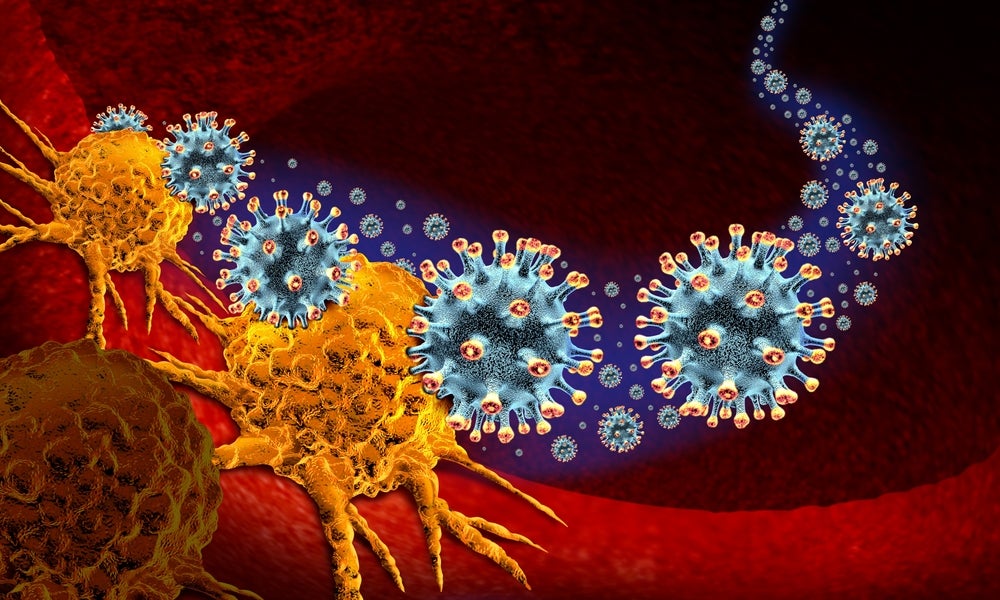Systemic lupus erythematosus (SLE) is an inflammatory autoimmune disease (AID) triggered by autoreactive B-cells. Current SLE treatment options include immunosuppressive agents and blocking antibodies that manage the disease, but these options are not curative. There is therefore an urgent need for advanced therapies for patients with severe or refractory SLE. Chimeric antigen receptor (CAR)-T cell therapies targeting CD19 have demonstrated success in the treatment of B-cell malignancies and could become a curative therapeutic option for SLE and some AIDs driven by auto-antibodies.
Following the initial report of the successful CAR-T treatment of five patients with SLE, as published in Nature Medicine in September 2022, a team from the Bavarian Cancer Research Institute and Friedrich-Alexander University presented new results from 15 patients with refractory AID at the 2023 American Society of Hematology’s (ASH) 65th Annual Meeting, held from 9 December to 12 December 2023. Patients with refractory SLE (n=8), idiopathic inflammatory myositis (IIM) (n=3), and systemic sclerosis (SSc) (n=4) were treated with Miltenyi Biomedicine’s MB-CART 19.1 cells via an expanded access programme. Eligibility criteria included signs of active organ involvement, failure of multiple immunomodulatory therapies and serious or immediately life-threatening disease.
Immunoglobulin G responses remained stable
Median disease duration before CAR-T treatment was three years (with a range between one and 20 years), and median follow-up after CAR-T treatment was 12 months (with a range between two and 28 months). All patients had failed a median of 5 previous treatments (having undergone between two and 14 treatments). After infusion, CAR-T cells rapidly expanded and CD19+ B cells were eliminated from peripheral blood. B-cells re-occurred at day 111±50 in 12 patients, and the remaining three patients had short follow-up times at the time of analysis (16, 51 and 77 days). Immunoglobulin G responses to standard vaccines remained stable up to month 24 and were boosted by re-vaccination. Total B-cell numbers gradually increased at month 12 and were mostly of a naïve phenotype. The early drop of CD19+CD27+ memory B-cells increased again at month 12, indicating maturation of the B-cells emerging after CAR-T treatment.
Overall, the safety profile of CAR-T treatment was favourable, with 11 patients experiencing grade 1–2 cytokine-release syndrome. No prolonged (greater than 28 days’ duration) bone marrow suppression occurred. All eight SLE patients reached complete remission after three months, and five SLE patients with a follow-up of between 14 and 24 months stayed in remission despite B-cell reconstitution. All IIM (3/3) and SSC (4/4) patients experienced a significant improvement. All 15 patients in the study (who had a median follow-up of 15 months) achieved drug-free remission. Longer follow-up is needed to establish long-term safety and durability of response.
More patients are affected by AID than by cancer
A number of companies are in the race to establish an early presence in the CAR-T cell therapies AID market. According to GlobalData’s Pharma Intelligence Centre, out of 14 CD19-targeting CAR-T cell therapies for AID in clinical development (Phase I and II) globally, 11 are in trials for SLE. In addition to Miltenyi Biomedicine’s MB-CART 19.1, Phase II SLE assets include JW Cayman Therapeutics’ relmacabtagene autoleucel, Kyverna Therapeutics’ KYV-101, Cabaletta Bio’s CABA-201 and Novartis AG’s rapcabtagene autoleucel. Phase I SLE CAR-T assets include Bristol Myers Squibb’s CC-97540, BRL Medicine’s BRL-301A, Gracell Biotechnologies’ GC-012F and assets from iCell Gene Therapeutics and Shanghai GeneChem.
CAR-T therapies carry the potential risk of secondary T-cell malignancies. In treating blood cancers, the overall benefits of these products outweigh the risks of their approved use. The benefit-risk balance may be different in autoimmune diseases, however, and could potentially restrict CAR-T use to the most severe refractory cases. Even though only a few AID indications and patient segments are likely targets for CAR-T cell therapy, significantly more patients are affected by AID than by cancer. GlobalData’s recent patient-based forecast model predicts the prevalence of SLE and LN (lupus nephritis) across the seven major pharmaceutical markets (7MM: France, Germany, Italy, Japan, Spain, the UK and the US), as well as the awareness of lupus, to increase in the coming years and result in a larger addressable patient population, reaching 424,000 treated cases and $3.5 billion in sales by 2031.

US Tariffs are shifting - will you react or anticipate?
Don’t let policy changes catch you off guard. Stay proactive with real-time data and expert analysis.
By GlobalData





